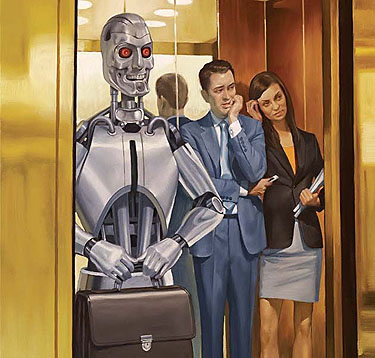I had a pretty caustic reaction yesterday to James Bessen’s column arguing that improvements in technology won’t have a big effect on middle-class workers. Tim Lee responded by calling it “uncharacteristically thoughtless and sneering.”
Thoughtless? Sorry, I plead not guilty to that. But sneering? Yeah, maybe a bit. Here’s the problem: Bessen happened to hit on one of my pet peeves: people who argue that workers ended up doing fine during  the Industrial Revolution, so they’ll end up doing fine in the upcoming Digital Revolution too. People who think otherwise are just modern-day Luddites who never learn.
the Industrial Revolution, so they’ll end up doing fine in the upcoming Digital Revolution too. People who think otherwise are just modern-day Luddites who never learn.
Now, there’s no question that workers in the 19th century feared that their livelihoods would be eliminated by machines. And although many of them were right in the short term, they were wrong in the long term: Machines ended up amplifying human labor, raising productivity so much that there were still jobs for everyone. So if the steam-powered Luddites were wrong then, why should we listen to the shiny new digital Luddites today?
This is obviously an appealing argument, but I happen to think it shows a serious lack of imagination. Smart machines won’t simply replace some parts of work, they’ll eventually replace all parts of work. As they get smarter, fewer and fewer people will be needed to maintain and program machines, and eventually no one at all will be needed. If machines ever achieve human-level intelligence, then by definition human labor will no longer be necessary.
But why should we believe this? It’s possible that I’m missing something. After all, as Bessen says, the Luddites were wrong. Karl Marx was wrong. A lot of smart people were wrong about the Industrial Revolution. I’m arguing that this time it’s different, but usually that isn’t the case.
True enough. But let me offer another story along these lines. It’s the story of Thomas Malthus.
You remember Malthus? In 1798 he predicted doom and gloom for the human race. Population grows geometrically, which means that any gains in productivity are soon swamped. If we produce more food, this simply encourages us to have more children, and more of those children survive to adulthood. This drives down wages and living standards to their old level, world without end. Permanent progress is impossible.
Today, Malthus has about the same reputation as the Luddites. But don’t let that fool you: he was a brilliant economist, and he was right. That is, he was right about all of human history right up to about 1798. So when optimists argued that machines might make life better, Malthusians had every right to scoff. The moldboard plow didn’t make life better. Neither did the printing press, or the lateen sail, or the cotton gin. Why should we believe that this time things would be different?
But they were. The rise of mechanical power really was different. As brilliant as he was, Malthus didn’t see that.
Here’s the moral of the story: Occasionally, things really are different this time around. The Industrial Revolution didn’t put everyone out of work, but it did upend millennia of stagnation in living standards. This is why I reacted a little peevishly to Bessen. It’s true that we’ve heard before that machines would destroy people’s jobs, and this should certainly give us pause. But it’s the beginning of the argument, not a slam dunk riposte. Sometimes, new technology really does change the world. Our job is to think hard about this stuff and try to figure out which inventions are game changers and which ones are just handy gadgets. It’s inexcusably lazy to simply argue that previous rounds of technology didn’t make humans obsolete, so neither will this one. You might not want to be a modern-day Luddite, but you don’t want to be a modern-day Malthus either.
This time, things will be different.
POSTSCRIPT: Needless to say, this entire argument is predicated on the belief that machines will fairly rapidly become roughly as intelligent as humans. If you don’t believe this, that’s fine. Make your case. But it’s a whole different conversation than the one about what will happen if machines keep getting smarter and smarter.


















